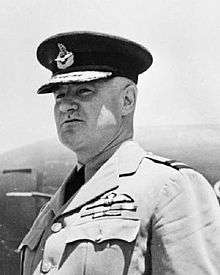Alfred Critchley
| Alfred Critchley | |
|---|---|
 Air Commodore Alfred Critchley in 1943 | |
| Born |
23 February 1890 Calgary, Alberta, Canada |
| Died | 9 February 1963 (aged 72) |
| Allegiance |
Canada United Kingdom |
| Service/branch |
Canadian Army (1907–18) Royal Air Force (1918–43) |
| Years of service |
1907–19 1939–43 |
| Rank | Air Commodore |
| Commands held |
No. 54 (Reserve) Group (1939–43) RAF Training Brigade (1918–19) |
| Battles/wars |
First World War Second World War |
| Awards |
Companion of the Order of St Michael and St George Commander of the Order of the British Empire Distinguished Service Order Mentioned in Despatches |
| Other work | Member of Parliament for Twickenham (1934–35) |
Air Commodore Alfred Cecil Critchley, CMG, CBE, DSO (23 February 1890 – 9 February 1963) was a military commander, entrepreneur and politician in the United Kingdom. He served as a Conservative Member of Parliament (MP) from 1934 to 1935.
Early life and military career
Critchley was born in Calgary, Alberta, Canada in 1890 and brought to England at the age of nine.[1] His first career was a military one, initially in Lord Strathcona's Horse, a Canadian military regiment and, towards the end of the First World War, in the Royal Flying Corps (RFC). He was seconded to the RFC on 4 March 1918 with the temporary rank of brigadier general[2] at the age of only 28. Remaining in the RFC and then Royal Air Force to the end of the war, Critchley played a senior role in organising training. By the end of the war he had become the youngest brigadier general in the British Imperial forces and had married Maryon Galt, the cousin of the wife of the press baron Sir Max Aitken, later Lord Beaverbrook.[1]
Business and politics
After the war Critchley involved himself in a number of business ventures in Central America before returning to the UK where he became a director of Associated Portland Cement. In 1926 he formed the private company, the Greyhound Racing Association. Under the auspices of this company he became a significant sporting entrepreneur in the UK. He introduced greyhound racing to the UK in Belle Vue, Manchester in 1926. The success of this initial trial led Critchley to purchase the White City Stadium in London. He subsequently built both the Harringay Stadium and Harringay Arena.[1]
He was married for a second time in London to Miss Joan Foster of Mount Street, London on 22 December 1927.[3]
Critchley contested the 1929 general election as a Conservative in the Manchester Gorton constituency, a safe seat for the Labour Party where he was heavily defeated.
In February 1931, he contested the Islington East by-election as a candidate for the Empire Free Trade Crusade and the United Empire Party, which both sought to make the British Empire a free trade bloc. The Empire Crusade had won the Paddington South by-election in October 1930, and hoped to repeat its success. Critchley came second, with 27.2% of the votes, and the Empire Crusade never won another seat.
He rejoined the Conservative Party, and won the Twickenham by-election on 22 June 1934. Nevertheless, he did not contest the 1935 general election.
He was a director general of the British Overseas Airways Corporation from 1943 to 1946.[4]
In 1953 he suffered a severe infection which caused him to go blind. In 1954 he was involved in the publishing deals of Robert Maxwell.[1]
Further reading
Critch! The Memoirs of Brigadier General, A.C. Critchley, London, Hutchinson, 1961
References
- 1 2 3 4 Ticher, Mike (2002). The Story of Harringay Stadium and Arena. Hornsey Historical Society. ISBN 0-905794-29-X..
- ↑ The London Gazette: (Supplement) no. 30582. p. 3405. 15 March 1918. Retrieved 1 July 2015.
- ↑ The Guardian, 23 December 1927
- ↑ Obiituary in The Guardian, 10 February 1963
External links
- Air of Authority – A History of RAF Organisation – Air Commodore A C Critchley
- Hansard 1803–2005: contributions in Parliament by Alfred Critchley
- Leigh Rayment's Historical List of MPs
| Parliament of the United Kingdom | ||
|---|---|---|
| Preceded by Hylton Murray-Philipson |
Member of Parliament for Twickenham 1934–1935 |
Succeeded by Sir Edward Keeling |